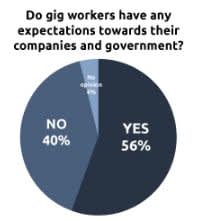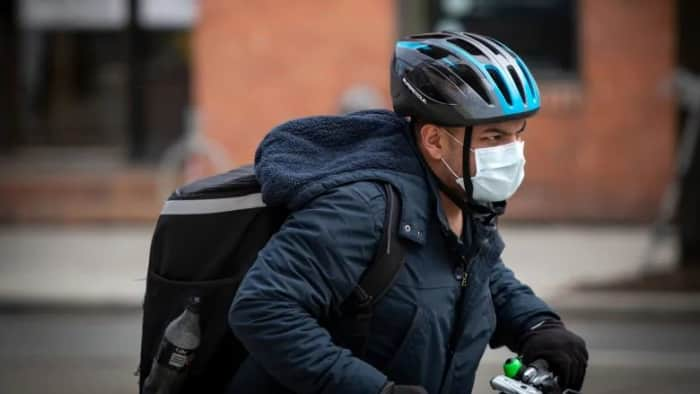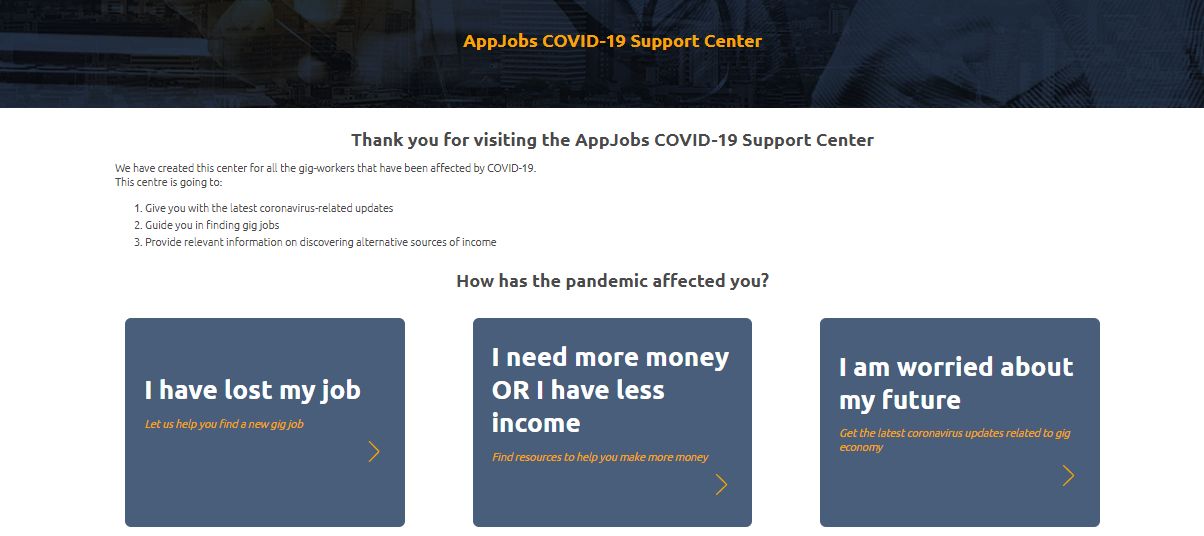As of March 2020, the worldwide response on both an individual and societal level was to “stay at home.” Some countries such as Spain, taking extreme precautions to combat the spread of the virus, have used drones to enforce the movement restrictions that the country put into place as BBC News reported. Yet for many people in countries all around the world, staying at home for work is not a possibility. Not only is staying home to work and social distancing not an option, but not working while sick is another problem many gig workers are faced with. Due to the fact that gig workers are technically classified as independent contractors, they are not only excluded from sick pay from the companies but many are also excluded from governmental aid.

With many workers worldwide finding themselves unemployed due to the closure of nonessential businesses, the question remains, what are governments as well as employers doing for their employees? In particular, what are gig-economy companies as well as governments doing for those who identify themselves as independent contractors opposed to employees and how are regulations including and excluding those?
Appjobs reached out to its members to see what challenges they face and what expectations they have for the government and the gig companies during this pandemic. We had 1400 members answer our survey questions to help us better understand what it means to be a gig worker during this crisis. The responses showed that those who are still working are concerned about contracting the virus while those who are not working would be happy to receive 50-60% of what they typically make.
Gig workers are worried about everything from being able to pay their electricity bills to the amount of waiting time before receiving any government aid. The graph below shows the breakdown, that about 56% do expect some help, with 40% expecting nothing, and the remaining 4% unsure of what to expect. You can find the full graphic here.

Source: AppJobs.com
What are governments doing to support the gig workers?
When asked what our members would like from the government they had many answers that all
seemed to align. Without a source of income, many answered that they would like for the government to reduce loan interest as well as freeze mortgages, utility bills, taxes, and rental prices. Many also voted in favor of receiving unemployment insurance and government assistance in stabilizing the situation. So what are the governments doing?
In the United Kingdom, the government has announced on their website that any person who is self-employed and out of work is eligible for a direct cash grant of 80% of their profits, up to £2,500 per month for three months. This is for anyone who has a trading profit of less than £50,000 in 2018-19 or an average trading profit of less than £50,000 from 2016-17, 2017-18 and 2018-19 where half of their income during these periods came from self-employment. Self-employed people can apply for universal credit over the phone or online, and they don’t need to worry about providing proof of the mandatory minimum income level.
In the US, a $2 trillion relief bill was passed in order to support Americans who have lost their jobs or are currently unemployed. New York Times reported the breakdown of how much each individual or household is receiving varies with most adults receiving around $1,200, although some may get less, and every qualifying child age 16 or under, will be an additional $500. Those looking to apply for their government assistance can apply online through their state’s unemployment benefits website. Although, there has been confusion on the state level as to whether the gig workers are eligible to receive the unemployment benefits. Most of the workers, according to CNBC, should be able to apply for benefits that give them half of their state’s average weekly unemployment benefits plus an additional $600 a week. However, many state pages are advising that self-employed, ie. gig workers are not allowed to apply for the benefits just yet and have to wait a few days. So while some workers are receiving the aid they so need, some have been stalled in the process.
While in Canada, the government is stepping in to aid those without paid sick leave who are sick, quarantined, or unable to work for reasons such as staying home with their children. They are waiving the one week waiting period for those in quarantine who have claimed EI sickness benefits and are also waiving the requirement of having a medical note to qualify for the benefits. The Canadian government is also providing $900 bi-weekly as income to thor who are self-employed or who are quarantined or sick but do not necessarily qualify for EI sickness benefits. One of the respondents remarked, “As for the government, it has become something much more personal recently. There is an open line of steady communication support. I am thankful for the steps being taken to reach out and offer support to all Canadian citizens. I feel proud more than ever and hope rather than expect that all their promises will be followed through to the best of their ability.”
How have platforms reacted to the COVD-19 outbreak?

Many companies have said that they are monitoring the situation and trying to find ways to cater to their customers while protecting the health of their employees and customers alike. When we asked our survey participants how they felt about the help given by the companies 70% of the respondents were unhappy with the quality of support they received, with 25% saying that the support was sufficient, and 5% having no opinion or mixed feelings.
As the pandemic unfolds, gig economy companies are taking different approaches to support their contracted employees. TaskRabbit has announced that there will be no cancellation or rescheduling fees should customers need to do so but they are still running. While food delivery companies such as Just Eat, Glovo, Deliveroo, Instacart, Foodora, Postmates, Grubhub, DoorDash/Caviar Postmates and DoorDash are instructing their drivers to practice no or low-contact deliveries whether that is leaving the food at the door or having customers give directions in-app to minimize interactions.
As for compensation, gig companies are trying to help the workers with many offering compensation should the workers get sick. For example, a Lyft spokesperson told Al Jazeera that the company will “provide funds to drivers should they be diagnosed with COVID-19 or put under individual quarantine by a public health agency.” CNBCalso reported that Uber and Lyft have stated that they will compensate their drivers for 14 days if they are affected by the virus. Instacart is also offering sick pay for those who become ill and fall under specified conditions. The delivery company, Deliveroo, told Fora that the company plans to provide support for their riders who are diagnosed or are told to isolate by a medical professional. While other companies, such as Postmates which has “launched the Postmates Fleet Relief Fund, which aids our Postmates in covering the costs of co-pays or medical expenses related to COVID-19, regardless of diagnosis.”
Alok Alström, the CEO of AppJobs, comments: “Gig workers are self-employed, which makes them an extra exposed group who seldom has the right of support from the government or a company. We at AppJobs are working hard to enable our members to find work, and new ways into the labor market”. As the pandemic continues, the grey area of employment in which gig workers fall into is becoming increasingly apparent. It has opened the eyes of employers and governments alike on what to do if such a pandemic were to surface again in the years to come and that there are some issues that need to be addressed further.
Where to look for support?
With the current situation, it can be hard to know where to find the help you need. We have made a COVID-19 dashboard to help meet your needs. The dashboard is constantly being updated with useful information to support our users. If you have lost your job, a great first step is to file for unemployment benefits. You can find the steps for doing that on our blog. A next step is to check our new employment opportunities on Appjobs.
Also, check the stories of other independent contractors, who were highly affected by coronavirus. Read more about how they handle during the difficult times, connect, help each other out and form a community during these difficult times with social distancing.
- When Calamity Strikes – An Insight Into A Driver’s Life Amid Coronavirus
- How independent contracting has changed with COVID-19 – a New Yorker’s story
Lastly, contact [email protected] if you need any help with navigating our website or are need of further assistance so we can make things easier during these difficult times.
